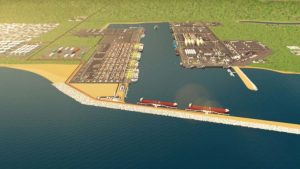By BEN EGUZOZIE
- Yet off the ground as Udom leaves office, despite FEC’s 2020 approval
- Development economists say seaport beyond state’s financial capacity
- Lekki FTZ, approved same time already operational
It is now only days before Udom Emmanuel’s administration expires, having served two terms. And a deep seaport he was to build for the state is yet to start construction eight years after. Not even the federal executive council’s (FEC’s) approval in 2020 could spur things up.
The project is the $4.2 billion Ibom Deep Seaport & Free Trade Zone (IDSP&FTZ) in Ibaka, to be built on 2,565 hectares of land south-east of the state. It has been on the drawing board since gaining a federal government approval in May 2015, with a RFQ (request for qualification) issued in January 2018. It was to be built via a public private participation (PPP) framework.
Financing the gigantic deep seaport remains a critical tough knot for a state taking the biggest monthly envelope from the federation accounts allocation committee (FAAC).
For instance, Business A.M.’s interpretation of Emmanuel administration’s body language is – it couldn’t kickstart the project – neither would the incoming Umo Eno government be able to begin operations on it. If so, will it ever be able to come on stream?
Some economists and development experts who spoke to Business A.M. said the definite construction of the Ibom Deep Seaport was well beyond the financial capacity of the Akwa Ibom government. That it requires the involvement of a monied, capable and experienced core investor – perhaps offshore. Is there any in place?
The government had set a Technical Committee for the Realisation of Ibom Deep Seaport, with Mfon Usoro, pioneer director-general and chief executive of the Nigerian Maritime Administration and Safety Agency (NIMASA) as its head. All approvals and the concessionaire for the port were ready by December 2020. The committee believed that concessionaire meant investor. Also, an international competitive procurement for investors was conducted with the backing of the federal ministry of transportation and the Infrastructure Concession Regulatory Commission (ICRC).
Bollore Africa Logistics, now Africa Global Logistics (AGL), emerged as the preferred bidder. The state government and AGL jointly paid for the onsite geotechnical and geophysical studies.
However, the technical committee says the status of the investor (AGL) has not been conclusive yet; until the state government and the preferred bidder jointly execute the concession agreement with the Nigerian Ports Authority.
So far, the state and AGL had jointly executed a heads of terms agreement (HTA) with the NPA. Execution of the concession agreement will be the final and conclusive step by the NPA, the project sponsor and the preferred bidder. The NPA had set up a joint committee on matters related to the project including negotiation of the concession agreement.
Till date, the state’s ministry of special duties and the technical committee jointly drive the Ibom Deep Seaport project. Many development analysts want a performance audit or an appraisal of the arrangement, to ascertain their work. Some others call for the establishment of a “task force” to take over the project.
They point to a similar task force called “Airport implementation committee” which successfully realised the Akwa Ibom International Airport in 2018, named after Victor Attah, former governor (1999–2007).
Other unrealised projects
An Ibom super highway and internal roads in host communities as ancillary services to the seaport are yet to start construction. The highway was intended to handle the expected traffic to the seaport. The seaport project was to engender awareness raising for local content maritime participation.
None of the expected maritime skill acquisition training of youth ever took place. There is the Maritime Academy at Oron. “This training is all too important so as to avoid past experiences when many Akwa Ibom indigenes were locked out of top technical and legal positions in the offshore oil giant, ExxonMobil, because of lack of requisite skills,” said one analyst.
Lekki, planned same time already operational
Whereas Ibom seaport is yet to begin construction after about eight years since it was planned, with FEC approval three years ago, Lekki FTZ, which was planned and approved same time with the IDSP&FTZ has since gone operational, with the Dangote Industries Refinery set for commissioning by May 22.
Many analysts say the jury is still out trying to make sense of the sucker punch the outgoing government of Udom Emmanuel has given the people of the state with the deep sea port orchestration.








